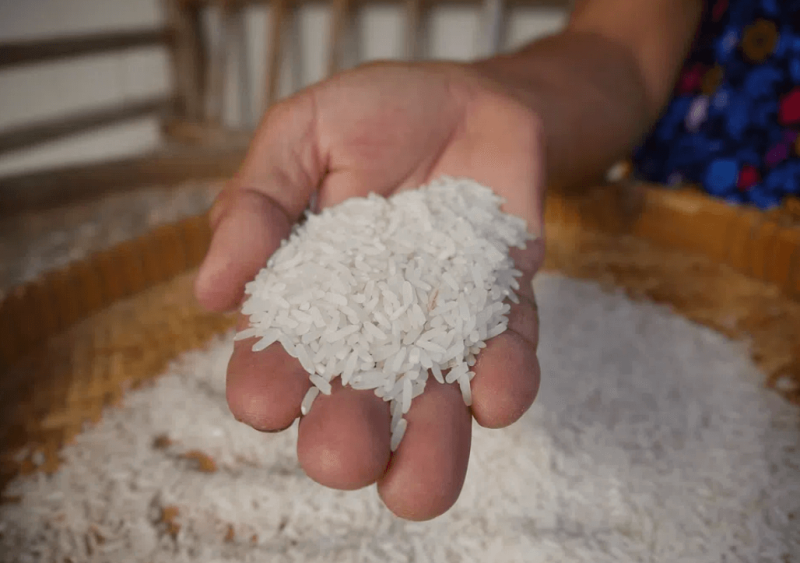Nutritional breakthrough: Genetically modified vitamin B1-fortified rice could help us overcome some health deficiencies
Nutritional breakthrough: Genetically modified vitamin B1-fortified rice could help us overcome some health deficiencies


Most vitamins cannot be produced by the human body and must be supplied by the diet. When the diet is varied, vitamin requirements are generally covered. But in populations where cereals such as rice are the main or even the only food source, deficiencies are common. This is particularly true of vitamin B1 (thiamine), a deficiency of which causes numerous nervous and cardiovascular diseases, such as beriberi.
Vitamin B1 in rice is lost during processing
Rice is the staple crop for half the world’s population, particularly in the tropical countries of Asia, South America and Africa. Rice grains are low in vitamin B1, and processing steps such as polishing (i.e. removing the bran by grating the peripheral layers) reduce it even further, taking 90% with them. This practice thus further aggravates chronic deficiencies.
The laboratory of Teresa Fitzpatrick, full professor in the Department of Plant Sciences at the UNIGE Faculty of Science, specializes in vitamin biosynthesis and degradation pathways in plants. Her group, in collaboration with a team from ETH Zurich and Taiwan’s NCHU, focused on improving vitamin B1 content in the endosperm of rice, i.e. the nourishing tissue that makes up the bulk of the seed, and therefore of what is eaten.
‘‘Previous attempts at biofortification by other teams had succeeded in increasing the vitamin B1 content of the leaves and bran – the outer layer of rice grains – but not that of the ready-to-eat rice grain. In our study, we specifically targeted the increase in vitamin B1 content in the endosperm,’’ explains Teresa Fitzpatrick, first author of the study. The scientists generated rice lines that express a gene that sequesters vitamin B1 in a controlled manner in the endosperm tissues. After growing in glasshouses, harvesting and polishing the rice grains, they found that the vitamin B1 content was increased in rice grains from these lines.
Promising experimental crops
The lines were then seeded in an experimental field in Taiwan and grown for several years. From an agronomic point of view, the characteristics analyzed were the same for both modified and unmodified rice plants. Plant height, number of stems per plant, grain weight and fertility were all comparable. On the other hand, the level of vitamin B1 in rice grains, after the polishing stage, is multiplied by 3 to 4 in the modified lines. This modification therefore enables vitamin B1 accumulation without impacting yield.
‘‘Most studies of this type are carried out with glasshouse grown crops. The fact that we have been able to grow our lines under real field conditions, that the expression of the modified gene is stable over time without any of the agronomic characteristics being affected, is very promising,’’ enthuses Wilhelm Gruissem, Professor emeritus at ETH Zurich and Distinguished Chair Professor and Yushan Fellow at NCHU. A 300-gram bowl of rice from this crop provides around a third of the recommended daily intake of vitamin B1 for an adult. The next step towards the goal of biofortified plants with vitamin B1 will be to pursue this approach in commercial varieties. However, regulatory steps relating to biofortification by genetic engineering will have to be taken before these plants could be cultivated.
Read the original post here

 | Videos | More... |

Video: Nuclear energy will destroy us? Global warming is an existential threat? Chemicals are massacring bees? Donate to the Green Industrial Complex!
 | Bees & Pollinators | More... |

GLP podcast: Science journalism is a mess. Here’s how to fix it

Mosquito massacre: Can we safely tackle malaria with a CRISPR gene drive?

Are we facing an ‘Insect Apocalypse’ caused by ‘intensive, industrial’ farming and agricultural chemicals? The media say yes; Science says ‘no’
 | Infographics | More... |

Infographic: Global regulatory and health research agencies on whether glyphosate causes cancer
 | GMO FAQs | More... |

Why is there controversy over GMO foods but not GMO drugs?

How are GMOs labeled around the world?

How does genetic engineering differ from conventional breeding?
 | GLP Profiles | More... |

Alex Jones: Right-wing conspiracy theorist stokes fear of GMOs, pesticides to sell ‘health supplements’




 Viewpoint — Fact checking MAHA mythmakers: How wellness influencers and RFK, Jr. undermine American science and health
Viewpoint — Fact checking MAHA mythmakers: How wellness influencers and RFK, Jr. undermine American science and health Viewpoint: Video — Big Solar is gobbling up productive agricultural land and hurting farmers yet providing little energy or sustainabilty gains
Viewpoint: Video — Big Solar is gobbling up productive agricultural land and hurting farmers yet providing little energy or sustainabilty gains Fighting deforestation with CO2: Biotechnology breakthrough creates sustainable palm oil alternative for cosmetics
Fighting deforestation with CO2: Biotechnology breakthrough creates sustainable palm oil alternative for cosmetics Trust issues: What happens when therapists use ChatGPT?
Trust issues: What happens when therapists use ChatGPT? 30-year-old tomato line shows genetic resistance to devastating virus
30-year-old tomato line shows genetic resistance to devastating virus California, Washington, Oregon forge immunization alliance to safeguard vaccine access against federal undermining
California, Washington, Oregon forge immunization alliance to safeguard vaccine access against federal undermining The free-range chicken dilemma: Better for birds, but with substantial costs
The free-range chicken dilemma: Better for birds, but with substantial costs ‘You have to treat the brain first’: Rethinking chronic pain with Sanjay Gupta
‘You have to treat the brain first’: Rethinking chronic pain with Sanjay Gupta
